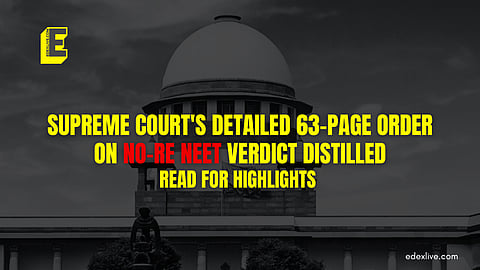

The Supreme Court, today, Friday, August 2, ruled that it cannot order a fresh National Eligibility Entrance Test - Undergraduate (NEET-UG) 2024 examination due to the lack of sufficient evidence indicating a systemic leak or malpractice compromising the exam's integrity, according to a PTI report
Additionally, the court expanded the remit of the Centre-appointed panel, led by former ISRO chief K Radhakrishnan, to review the National Testing Agency's (NTA) operations and recommend examination reforms for the NEET-UG.
The Supreme Court stated that with the expanded remit of the panel, the committee is expected to submit its report by September 30, detailing various measures to address deficiencies in the examination system.
As per PTI, Chief Justice DY Chandrachud and Justices JB Pardiwala, and Manoj Misra gave detailed reasons for its July 23 order and refusal to cancel the NEET-UG 24 examination.
What reasons did the court give for no Re-NEET?
1) No discrepancies in the data
The court said in a detailed order that an assessment of data shows that there have been no discrepancies in the examination. "The material on record does not, at present, substantiate the allegation that there has been widespread malpractice which compromised the integrity of the exam. On the contrary, an assessment of the data indicates that there are no deviations that indicate that systemic cheating has taken place," stated the Court.
2) No extensive dissemination of paper
Chief Justice Chandrachud, writing on behalf of the bench, stated that the current information does not indicate that the question paper was widely disseminated via social media or the internet, nor does it suggest that answers were being communicated to students through sophisticated electronic means that may be difficult to trace.
The court said that since the incidents were localised, it is possible to segregate the beneficiaries of the leak, from the rest, hence, this nullifies the possibility of holding a re-exam
"The students who were beneficiaries of the leak at Hazaribagh and Patna are capable of being identified. The CBI investigation reveals the number of students who are the beneficiaries of the malpractice at Hazaribagh and Patna at this stage. This leads us to conclude that it is possible to separate the beneficiaries of malpractice or fraud from the honest students. This being the case, the court cannot direct a re-exam," asserted the bench.
3) Re-test may disrupt academic schedule
The court further stated reasons as to why the cancellation of the exam would be unjustifiable.
"If it is possible to separate the tainted candidates from the untainted ones, there would be no justification to cancel the exam. This is because honest candidates would be made to suffer without reason due to the actions of some unscrupulous candidates. It is also important for the response to malpractice to be proportionate. Ordering a re-test would disrupt the academic schedule for the year," it said.
Criticism against NTA
In the 63-page detailed order, the CJI was also critical of NTA' s conduct.
Serious concerns regarding the conduction of exam
The order stated that while the issues examined by the court do not indicate a systemic compromise of NEET's integrity, the way the NTA organised the exam this year raises serious concerns. "The manner in which NTA has organised the exam this year gives rise to serious concerns," it asserted.
The court emphasised that the NTA, responsible for conducting crucial competitive exams, cannot afford mistakes or incorrect decisions that they can later amend again.
All decisions must be well-considered, reflecting their importance, as inconsistency undermines fairness. "All decisions must be well-considered, with due regard to the importance of the decision. Flipflops are an anathema to fairness," the bench said.
Participation of lakhs of students cannot be used as an excuse
The bench acknowledged that conducting a national-level exam with tens of lakhs of students participating requires immense resources, coordination, and planning, but they cannot use this as an "excuse", as they have adequate funding and resources at disposal.
"But that is precisely the reason for the existence of a body such as NTA. It is no excuse to say that the exam is conducted in myriad centres or that a large number of aspirants appear for the exam. NTA has sufficient resources at its disposal. It has adequate funding, time, and opportunities to organise exams such as the NEET without lapses of the kind that occurred this year," it said.
NTA should inspire public confidence
The bench highlighted several lapses by the NTA, including a security breach at an examination centre in Hazaribagh, Jharkhand, where the rear door of the strongroom was opened, allowing unauthorised individuals to access the question papers. Other issues included the transport of question papers by e-rickshaws and the incorrect distribution of question papers among candidates.
The order noted that initially, 67 aspirants scored a perfect 720/720 in NEET. After removing compensatory marks and conducting a re-test for 1,563 candidates, the number of perfect scores dropped to 61. The number further decreased to 17 following the recomputation of marks due to the revision of the answer key.
The bench said that NTA's responsibility should be to inspire public confidence.
"The intervention of the Court, reports by the media, and representations by candidates ensured that these changes were made in the interests of fairness and justice. However, the system adopted by NTA should be such that just outcomes are reached even when these external catalysts are not present. The system must be such as to inspire public confidence," the order said.
The Supreme Court instructed the NTA to address all concerns highlighted in its judgment and requested the seven-member committee, led by former ISRO chairman K Radhakrishnan, to keep these issues in mind while making its recommendations.
